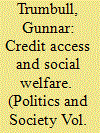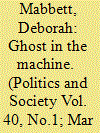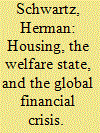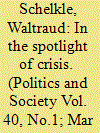| Srl | Item |
| 1 |
ID:
110871


|
|
|
|
|
| Publication |
2012.
|
| Summary/Abstract |
Old-age income protection is provided in wealthy democracies by publicly funded defined-benefit pensions. Budgetary challenges have forced policy makers to consider private alternatives to these traditional systems. I consider the shortcomings of private saving arrangements in duplicating the advantages of public pensions. Some shortcomings can be overcome by introducing compulsory elements into private saving plans. Worker contributions into such plans could be mandatory; some or all worker accumulations in the plans could be converted to annuities at retirement; and workers' investment choices could be narrowly circumscribed. These restrictions do not eliminate the biggest weakness of private saving plans. Fluctuations in asset prices make it hard even for well-informed savers to select an affordable saving rate and an investment strategy that will assure decent income in old age. Public pension systems partly insulate workers against economic and financial market risks by sharing those risks broadly across workers, retirees, and taxpayers in multiple generations.
|
|
|
|
|
|
|
|
|
|
|
|
|
|
|
|
| 2 |
ID:
110868


|
|
|
|
|
| Publication |
2012.
|
| Summary/Abstract |
Research into the causes of the 2008 financial crisis has drawn attention to a link between growing income inequality in the United States and high household indebtedness. Most accounts trace the U.S. idea of credit-as-welfare to the period of wage stagnation and welfare retrenchment that began in the early 1970s. Using France as a comparison case, I argue that the link between credit and welfare was not unique to the United States. Indeed, U.S. charitable lending institutions that emerged at the beginning of the twentieth century were modeled in part on older French financial institutions. Three historical factors drove U.S. lenders and policymakers to push for expanded credit access for the working class. First, welfare reformers in the interwar period embraced private credit as an alternative to an expansive welfare state. Second, U.S. organized labor in the wake of World War II embraced credit access as a means to sustain industrial employment and finance strike actions. Third, commercial banks in the 1950s began offering revolving credit accounts as a means to attract new depositors at a time when banking regulation restricted the interest they could offer on deposits.
|
|
|
|
|
|
|
|
|
|
|
|
|
|
|
|
| 3 |
ID:
110870


|
|
|
|
|
| Publication |
2012.
|
| Summary/Abstract |
The crisis of 2007-09 was prefigured by bubbles in the housing and mortgage credit markets of major Organisation for Economic Co-operation and Development (OECD) countries. A comparison of the United States, the United Kingdom, and France reveals that, contrary to popular perception, the two European countries had a bigger housing price bubble, more volatility, and a more short-termist mortgage market. Yet, the fallout of the crisis-in terms of overindebtedness of mortgage holders, foreclosures of homes, and the extent to which the "nest-eggs" of households were devalued-has been worse in the United States. This article explores which differences in the use of credit markets for the social policy of promoting homeownership can account for this puzzling finding.
|
|
|
|
|
|
|
|
|
|
|
|
|
|
|
|
| 4 |
ID:
110872


|
|
|
|
|
| Publication |
2012.
|
| Summary/Abstract |
The United States has introduced automatic enrollment into retirement savings schemes, and the United Kingdom is in the throes of doing so. The financial crisis has reminded us that returns on these schemes can be poor, even negative. Behavioral economics shows that people can be "nudged" into schemes regardless, but it also implies that the liberal account of market legitimation through informed choice cannot be applied. This article examines how risks are assigned in schemes and how enrollees might seek recourse if their expectations are disappointed. Comparing the United States and the United Kingdom, it argues that enrollees are more likely to seek recourse from the government in the United Kingdom. The explanation can be found in regulatory decisions that reflect the structure of each country's public pension scheme. This structure is conducive to private risk bearing in the United States, but not in the United Kingdom, suggesting that regulatory market liberalism is undermined by a residual approach to public provision.
|
|
|
|
|
|
|
|
|
|
|
|
|
|
|
|
| 5 |
ID:
110869


|
|
|
|
|
| Publication |
2012.
|
| Summary/Abstract |
Analyses of the global financial crisis that assign causality to the erosion of parts of the welfare state that protected individuals miss the importance of macro level regulation that protected firms and the financial system from itself. Post-Depression macro level regulation of finance prevented the emergence of mismatched maturities where deposits lacked state guarantees, and thus prevented runs on banks or near-banks. A balance sheet approach shows that macro regulation linked long duration liabilities in housing finance (mortgages) to long duration assets (pensions). Deregulation permitted the reemergence of mismatched maturities, providing both a necessary and sufficient condition for the current financial crisis.
|
|
|
|
|
|
|
|
|
|
|
|
|
|
|
|
| 6 |
ID:
110867


|
|
|
|
|
| Publication |
2012.
|
| Summary/Abstract |
This special issue of Politics & Society explores the relationship between social policy and financial markets, which was thrown into sharp relief by the financial crisis of 2007-09. The research asks how particular social policies underpin and even create financial markets, specifically mass markets for consumer finance, mortgages, and pensions.
|
|
|
|
|
|
|
|
|
|
|
|
|
|
|
|